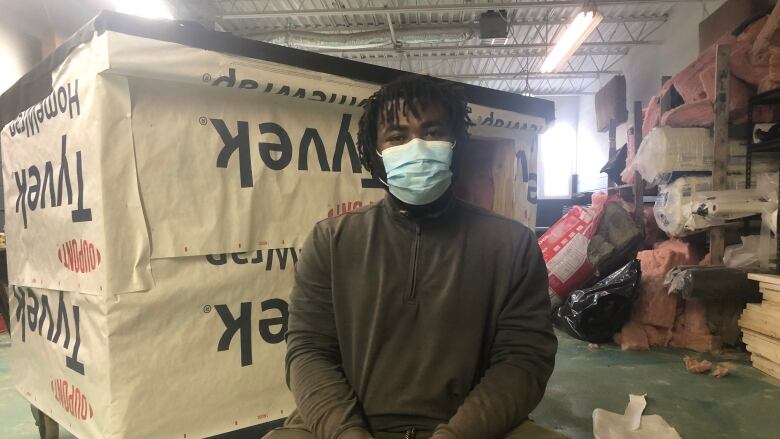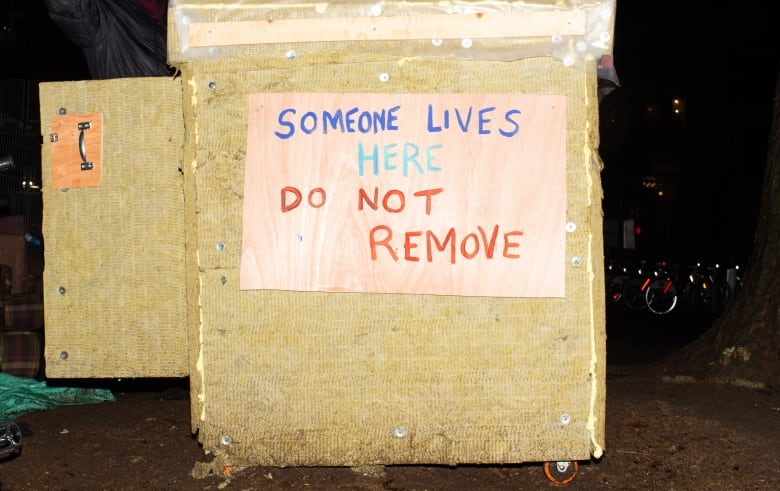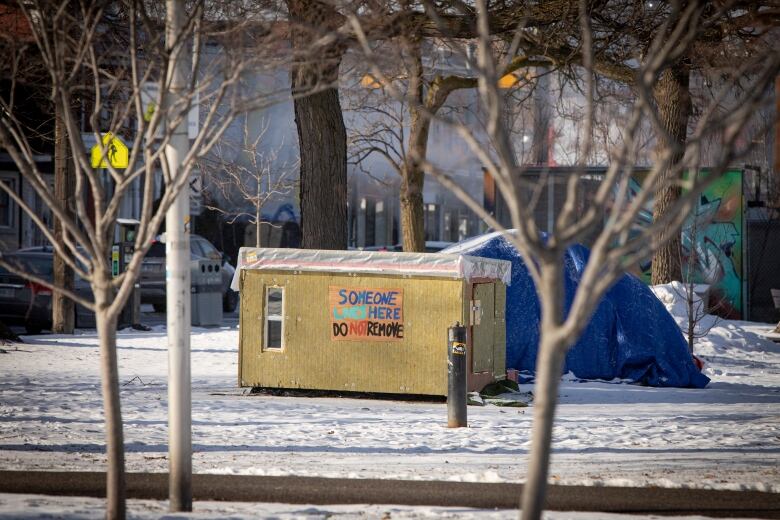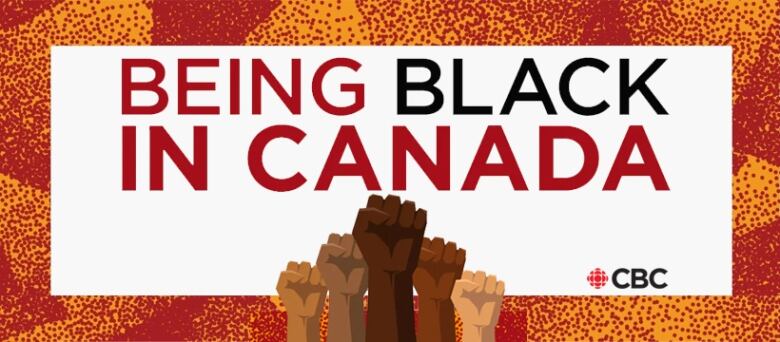Toronto carpenter who builds tiny shelters for unhoused people calls on city to drop legal fight
Khaleel Seivwright says money being spent by city on court fight should go towards 'safe housing'

A Toronto carpenter who has built tiny wooden shelters for unhoused people is calling on the city to drop its application for an injunction that would stop his work.
"The money the City is spending to attack me could be put into safe housing for those that need it," Khaleel Seivwright said in a statement provided by his lawyers on Monday.
The city filed the application with the Ontario Superior Court on Feb. 12 to prevent what it considers illegal dumping of wooden shelters on city property. The city considers the wooden structures unsafe. Seivwright is named in the application.
Seivwright said he constructed the shelters as a "temporary solution" to provide unhoused people with warm spaces in winter during the COVID-19 pandemic until they can find alternative housing. Each shelter comes with a smoke and carbon monoxide detector and a fire extinguisher. He said the shelters were given to community members to distribute.
"Instead of working with me, the City sued to stop me from building and relocating the tiny shelters. This is a distraction. The problem is not the tiny shelters. The problem is that Toronto's most vulnerable people are falling through the cracks," Seivwright said in the statement.
WATCH | Khaleel Seivwright responds to the city's application for an injunction:
The application was filed before a fatal fire in a makeshift structure in a downtown Toronto park on Feb. 17. That structure became engulfed in flames in Orphans Green Park, in the area of Adelaide Street East and Power Street, in the city's Corktown neighbourhood.
A man inside the shelter was pronounced dead at the scene.
It isn't clear who built the structure destroyed by the fire, whichis stillunder investigation.
City not suing carpenter, spokesperson says
Brad Ross, spokesperson for the city, said the city is not suing Seivwright.
"The City is seeking an injunction to stop placing or relocating wooden structures in parks and rights-of-way. The City is not suing Mr. Seivwright. The City is not suing anyone," Ross said in an email on Monday.
"The City is also concerned with statements made to move or relocate structures elsewhere in parks. The injunction speaks to this issue, in addition to any future illegal placement of new structures."

Ross said the city is "very much concerned" about encampment fires. He said there has been a 250-per-cent increase in encampment firesfrom 2019 to 2020.
"Everyone deserves the dignity of a safe indoor space," Ross said.
"Our motivation, as you say, is safety safety of those in encampments, the safety of first responders and the safety of the surrounding community where encampments exist," he continued.
"Furthermore, all residents of the city have a right to use and enjoy the city's parks, provided they do not violate the parks bylaw, which prohibits camping in parks or dumping illegal structures."
As for any costs incurred by the city in the filing of the application, Ross added: "The City's in-house legal counsel work on this file there are no 'legal fees.'"
City seeks permanent restraining order
According to the application, the city wants an order that would permanently restrain Seivwright from placing or relocating structures on city-owned land. It says installing structures in city parks is against its bylaws, which prohibit camping and living in parks.
A hearingdate for the injunction has not yet been set.

Seivwright has been building the shelters since the fall and has raised more than $222,000 for materials through a GoFundMe page. On Feb. 11, he said on thatpage that he has stopped building the shelters but is continuing to do maintenanceand relocate them as people living outside get housing.
Samara Secter, with Addario Law LLP and one of three lawyers representing Seivwright, said it is not yet known how much it will cost Seivwright to fight the case. She said who is covering the costs is privileged information.
"It's always hard to predict costs when a big organization with lots of resources, such as the city, is involved," she said.
Secter said the defence will consider the following when it prepares its arguments: that the city is doing what the lawyers say isan "inadequate" job of providing shelter for unhoused people; the shelter system itself is often at capacity; individuals have benefited from the tiny shelters; and Seivwright acted to reduce harm.
Encampment residents appreciate shelters, carpenter says
In the statement, Seivwright added: "Encampment residents tell me how important the tiny shelters have been for safety, for privacy, for dignity. I hope there will be a day that the tiny shelters are no longer needed, but that day has not yet come."
He noted that people have nowhere to go when the city's shelters are at capacity.
"The City of Toronto should drop its application against me and focus its resources and efforts on what matters getting people safely housed. It's February. The City should not be removing or destroying tiny shelters until real alternatives exist and COVID-19 is under control."
Seivwright said he is grateful for the "outpouring of support" from community members who want the shelters to be available.
For more stories about the experiences of Black Canadians from anti-Black racism to success stories within the Black community check out Being Black in Canada, a CBC project Black Canadians can be proud of.You can read more stories here.

With files from Nick Boisvert, Liam Casey of The Canadian Press












_(720p).jpg)


 OFFICIAL HD MUSIC VIDEO.jpg)
.jpg)



























































































